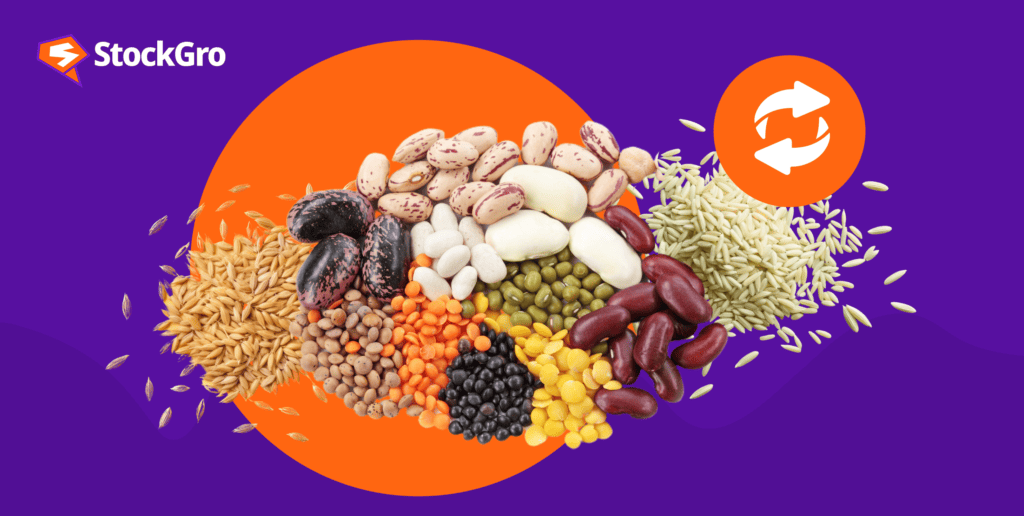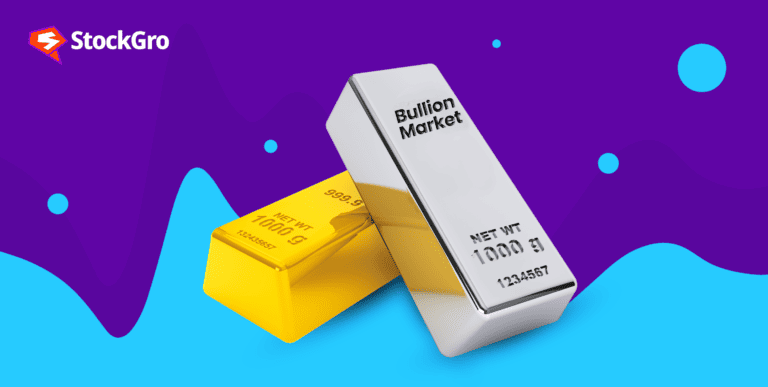
The NCDEX was established in 2003 in Mumbai and today, most large financial institutions have some stake in the commodities traded on NCDEX every day.
In this article, we’re going to explore what the NCDEX is, the commodities it trades, and why they’re important to the economy.
Understanding the NCDEX
Background
NCDEX was established with the aim of creating a transparent and efficient marketplace for agricultural commodities. Like every other exchange in the country, it operates under the regulatory framework of the Securities and Exchange Board of India (SEBI). When it was founded, it was a public-private partnership with the participation of various stakeholders, including financial institutions, agri-business companies, and others.
You may also like: What is a commodity? A short guide before you trade
Overview
Based on the number of contracts and value generated, the NCDEX is one of the top commodity exchanges in India second only to the MCX, which focuses mostly on energy and metals. Today, the NCDEX also allows investors to trade futures for 23 commodities and options for 7 commodities. The exchange itself also provides clearing services for derivatives contracts traded on the exchange.
Commodities traded on the NCDEX include pulses, spices, and sugar, which are not traded electronically anywhere else. Not only are these commodities important from a national point-of-view, they are also important to traders seeking to make arbitrage profits.
Here is an overview of the wide range of commodities that the NCDEX deals in:
Agricultural Commodities:
- Grains: Wheat, rice, maize, barley, etc.
- Oilseeds: Soybean, mustard, castor seeds, etc.
- Pulses: Chickpea, pigeon pea, lentils, etc.
- Spices: Turmeric, cardamom, jeera (cumin), etc.
Non-Agricultural Commodities:
- Metals: Gold, silver, aluminium, copper, etc.
- Energy: Crude oil, natural gas, etc.
Futures trading in the NCDEX vs. the NSE
Futures in every market, no matter whether it’s the NSE or the NCDEX, operate using the same principles. However, here are some differences:
- The underlying security – NSE is primarily an equity and equity derivatives exchange. Futures contracts on NSE are agreements to buy or sell a specific quantity of equities. However, on the NCDEX, the underlying assets are commodities, which means that you could buy or sell the same derivatives for commodities like mustard, etc.
- Participants in the market – Since commodity markets and by extension their trading is not as popular as equity markets, the latter is naturally inclined towards participants that are already involved in the commodity production and supply chain processes. The NSE, on the other hand, is geared to provide a seamless investing environment for all kinds of retail and institutional investors.
- Sophistication – Since the NSE is much larger and more accessible to the general population, it is also more complex, and in turn, more sophisticated. Since not nearly as many people trade commodities actively, the NCDEX is not as sophisticated in both regular trading and in futures trading.
Also Read: Understanding the concept of Commodity Transaction Tax (CTT)
The clearing process of the NCDEX
The clearing process in an exchange is like a middleman that makes sure trades go through smoothly and securely. When two people trade on an exchange like the NCDEX, a clearinghouse steps in to guarantee that the trade’s financial obligations are met. This clearinghouse becomes the middle point between the buyer and the seller, taking on the role of the main entity for clearing and settling the trade.
The clearing house is also responsible for carrying out key calculations, like net positions, adjustments to prices according to the current market value, and sets requirements for collateral. By doing this, the clearinghouse reduces the risk between the two parties, adds transparency, and helps keep the overall financial system stable and trustworthy.
In this particular case, the NCDEX Clearing Corporation Limited (NCCL) acts as a clearinghouse. It does important jobs such as matching trades, managing risks, and figuring out how much each party needs to settle. To make sure everything is safe, NCCL uses tools like margin requirements, which ensures that traders have enough money to cover risky bets if things don’t go their way.
Contributions of the NCDEX
There are several contributions that an exchange like this makes to the overall economy. Here are some of them:
- The NCDEX establishes and maintains an online futures market for agricultural products, and thereby ensures market transparency in terms of cost for these goods.
- Price discovery for farmers (who produce these items) is made easier because the exchange provides them with information on movements and trends. By referring to future prices, farmers can also adjust their current prices to benefit from the arbitrage.
- Previously, middlemen controlled the market information in India. The introduction of an online, real-time exchange like this removes the middleman and makes goods cheaper for the buyer and more profitable for the seller.
- NCDEX also sets quality standards for the goods it deals with, which has also raised quality awareness in the markets. Farmers are now focusing on passing testing requirements, which results in a higher-quality product for the consumer.
Also Read: Build a better portfolio: How to invest in commodities for the long run
Becoming a member of the NCDEX
The steps are simple.
- Choose a registered broker: Begin by selecting a commodity broker that is a member of the National Commodity and Derivatives Exchange (NCDEX). Ensure that the broker you choose has a good reputation for security and regulatory compliance. Open a trading account and complete the KYC process.
- Deposit money into your trading account: If you want to start with derivatives trading right away, you will have to deposit margin money. Different brokers have different margin requirements.
- Start trading on the NCDEX: Use the trading platform provided by your broker to make your first trade. Remember not to put all your eggs in one basket and to hedge your bets to cut your losses per-trade short to something that is appropriate to your risk appetite!
Conclusion
In conclusion, the NCDEX is an electronic exchange in India that deals majorly in agricultural products. Except for the underlying assets, the market cap, and some market participants, there isn’t much difference between the NSE, which is the biggest exchange in India, and the NCDEX.
